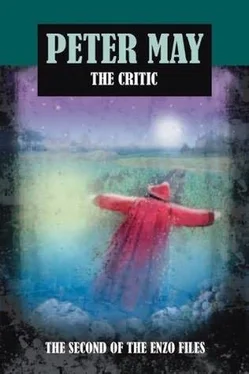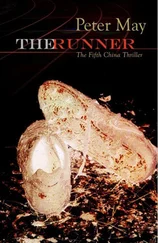Peter May - The Critic
Здесь есть возможность читать онлайн «Peter May - The Critic» весь текст электронной книги совершенно бесплатно (целиком полную версию без сокращений). В некоторых случаях можно слушать аудио, скачать через торрент в формате fb2 и присутствует краткое содержание. Жанр: Классический детектив, на английском языке. Описание произведения, (предисловие) а так же отзывы посетителей доступны на портале библиотеки ЛибКат.
- Название:The Critic
- Автор:
- Жанр:
- Год:неизвестен
- ISBN:нет данных
- Рейтинг книги:5 / 5. Голосов: 1
-
Избранное:Добавить в избранное
- Отзывы:
-
Ваша оценка:
- 100
- 1
- 2
- 3
- 4
- 5
The Critic: краткое содержание, описание и аннотация
Предлагаем к чтению аннотацию, описание, краткое содержание или предисловие (зависит от того, что написал сам автор книги «The Critic»). Если вы не нашли необходимую информацию о книге — напишите в комментариях, мы постараемся отыскать её.
The Critic — читать онлайн бесплатно полную книгу (весь текст) целиком
Ниже представлен текст книги, разбитый по страницам. Система сохранения места последней прочитанной страницы, позволяет с удобством читать онлайн бесплатно книгу «The Critic», без необходимости каждый раз заново искать на чём Вы остановились. Поставьте закладку, и сможете в любой момент перейти на страницу, на которой закончили чтение.
Интервал:
Закладка:
‘Don’t worry about it. The gasoline’s going on your bill.’ There was a shuttle bus waiting out front. ‘It’s just a five minute ride to the parking lot.’
They headed south and west to the Burlingame airport parking lot on the 101, spectacular views across the Bay off to their left, afternoon sun coruscating across diamond blue water liberally sprinkled with the white sails of myriad small boats. It seemed extraordinary to Enzo that he had left Paris midmorning, had flown for more than eleven and a half hours, and it was still just early afternoon in San Francisco. Fatigue, he knew, would catch up with him quickly.
The shuttle dropped them at MacConchie’s car and Enzo put his bags in the trunk. They sat inside and MacConchie turned the key in the ignition. Then he turned and looked at his old friend from university and cocked his head. ‘You got the samples with you?’
‘Of course.’
‘Man, you must have moved mountains to get the paperwork through this fast.’
‘I didn’t.’
MacConchie frowned. ‘Well, how’d you get them through customs?’
Enzo grinned and lifted up his kilt to reveal an underskirt of plastic sample bags strung together with thin plastic cord. ‘I’m always getting asked what I wear under there, but no one ever dares to look.’
II
Sonoma was a small town of one and two storey buildings in brick and clapboard siding at the southern end of one of the most famous wine-growing valleys in California. It was a town of church spires and picket fences and a population of just over nine thousand. Its tree-filled downtown square had once been the sacred meeting ground of the Pomo and Miwok Indians.
‘Home of the last mission in California,’ MacConchie said. ‘It was the Franciscan monks in the missions who laid the foundations for wine growing in California, you know. They planted and cultivated the first vines, though it was mostly brandy and fortified wines they made back then.’
He turned along Napa Street on the south side of the square and headed west until they reached Sixth Street, and he took a right and pulled into a parking lot in front of a low, single-storey building. A large sign planted in the lawn read “OENOPHILES INC.”
MacConchie said, ‘Of course, the Americans don’t know how to spell. When I first had the sign painted, I had to have to the guy come back and put an “O” in the front of it.’
Enzo sipped on a mug of stewed, watery coffee and wondered how people could drink it like this. He had taken the wine sample from the bottle of aftershave in his toilet bag, and MacConchie had put it in a refrigerator in the lab. Then he had removed his underskirt of soil samples to pile them up on a table by the window in MacConchie’s office. A G5 Macintosh computer on a worktop next to it ran constant checks on incoming e-mail. MacConchie leaned his elbows on a desk devoid of papers, his own reflection looking back at him from polished wood, and said, ‘People think I’m a heretic because I don’t go for all this flavour wheel, cherry-berry bullshit. Wine is science. What we consider good, we can quantify scientifically.’
‘How?’ Enzo was curious.
MacConchie grinned. ‘Trade secret.’
‘Aw, come on, Al. It’s me you’re talking to.’
‘You know, Magpie, I’ve got nearly a hundred clients paying me fifty grand a time to share my secret. You got that kind of money?’ Enzo did the calculation, and MacConchie enjoyed the expression that wrote itself across his face. ‘Come a long way from the east-end of Glasgow, huh?’
‘How in God’s name did you get involved in the wine business, anyway, Al?’
MacConchie shook his head. ‘Never meant to, Magpie. Came out here with a degree in chemistry looking for a job in industry. Ended up working one summer at a winery painting barrels with mildicide and stayed on for the crush.’
‘The crush?’
‘The vendange you guys call it. The harvest. Anyway, that’s where the interest started. I went back to university, did a PhD, and got myself involved in a discipline called chemical ecology, which studies the interrelation of environment and plant biochemistry. That led me to some research already done by the Japs and others into the chemistry of grapes. Ended up sifting through the hundreds of chemical compounds you’ll find in fermented grape juice. You know, tannins, phenols, norisoprenoids, that kind of stuff. Identified eighty-four of them that comprise those flavours, and smells, and colours that make wine special. Thirty-two in reds and fifty-two in whites. Put them together in the right quantities and you’ll end up making wine that’s going to get a ninety score or better from Parker or the Wine Spectator. Or an A or B from Petty in his day.’
‘But how do you do that? How do you know what makes a great wine?’
MacConchie smiled. ‘Easy. Choose one that everyone agrees is great, like a 2003 Petrus Pomerol, and take it apart, molecule by molecule. Once you know its chemical profile, it’s not so hard to recreate it.’
Enzo shook his head in wonder. ‘That would be anathema in France.’
‘Sure. They make great wines there because they have hundreds of years of tradition and experience behind them. Plus great terroir. And, hey, I’m not one of those that thinks terroir’s not important. The weather, the temperature, the lie of the land, the chemistry of the soil.’ He waved a hand at Enzo’s “underskirt” lying on the table. ‘Those samples you brought. Each and every one of them will produce a different wine from the same grape. I’m just using science and technology to achieve the same effect.’ He grinned. ‘You know what the main difference is between any one of my clients and a French wine producer? The French guy’s driving a tractor. My guy’s driving a Porsche.’
‘You’re still not letting me into the secret.’
‘Hey, Magpie, a secret’s a secret. But I’ll tell you this much, it’s mostly about number-crunching. Facts, figures, statistics.’ He nodded towards his computer. ‘They’re all in there. In the database. Most winemakers decide when to harvest the grape by using a hydrometer to measure sugar content. You know when the hydrometer was invented? 1768. Shit, man, talk about old technology! My clients send me their grapes once a week. I crush them, process them, run them through a liquid-liquid chromatograph connected to a spectrometer that feeds direct into my computer. And they get to pick their grapes at the moment of perfection. It’s not a judgment call; it’s science.
‘And, you know, it doesn’t stop there. Once it’s in the barrel, I run tests at regular intervals. Wines are hard to taste in the early days, but I can measure the key compounds, and can make a quality judgment from the facts and figures in my database. We can then make virtual blends between barrels and run the figures through the computer to see how they’ll taste. That way, you don’t actually have to mix the wine until you know it’s going to be good.’
He laughed. ‘I had dinner with a client the other week. He produced a bottle of his best wine. I told him I would be really interested to taste it. I’d only ever tried it on my computer screen.’ He leaned confidentially across his desk. ‘These wine critics… Petty, Parker and the rest. They’re so goddamned predictable. I say to them, this is what you like? Okay this is what I’ll make. In a blind tasting I’ll predict nine times out of ten the score they’re going to give. And do you know what kind of power that gives me, Magpie? It’s like knowing today what a stock’ll do tomorrow. It’s inside info.’
And Enzo thought of the lengths that Petty had gone to just to keep his ratings secret. Of the alchemy that Laurent de Bonneval had talked about at Chateau Saint-Michel when Enzo first arrived in Gaillac. MacConchie was exploding it all. The myths, the mysticism, and two thousand years of tradition. His secret for success was a marriage of Silicon and Napa Valleys; his wines constructed from the building blocks of molecules. And Enzo couldn’t help but wonder if in all this science, the fundamental human component might be missing. The instinct, flair, and sophistry of which Bonneval had spoken. That element impossible to define by maths or science-the personality of the winemaker.
Читать дальшеИнтервал:
Закладка:
Похожие книги на «The Critic»
Представляем Вашему вниманию похожие книги на «The Critic» списком для выбора. Мы отобрали схожую по названию и смыслу литературу в надежде предоставить читателям больше вариантов отыскать новые, интересные, ещё непрочитанные произведения.
Обсуждение, отзывы о книге «The Critic» и просто собственные мнения читателей. Оставьте ваши комментарии, напишите, что Вы думаете о произведении, его смысле или главных героях. Укажите что конкретно понравилось, а что нет, и почему Вы так считаете.












